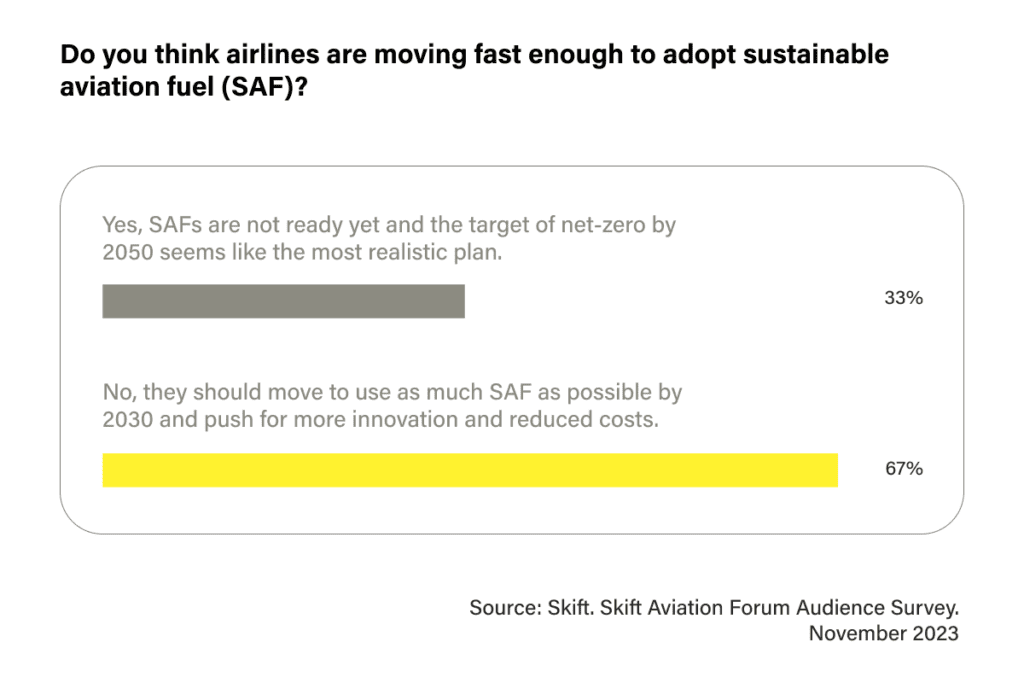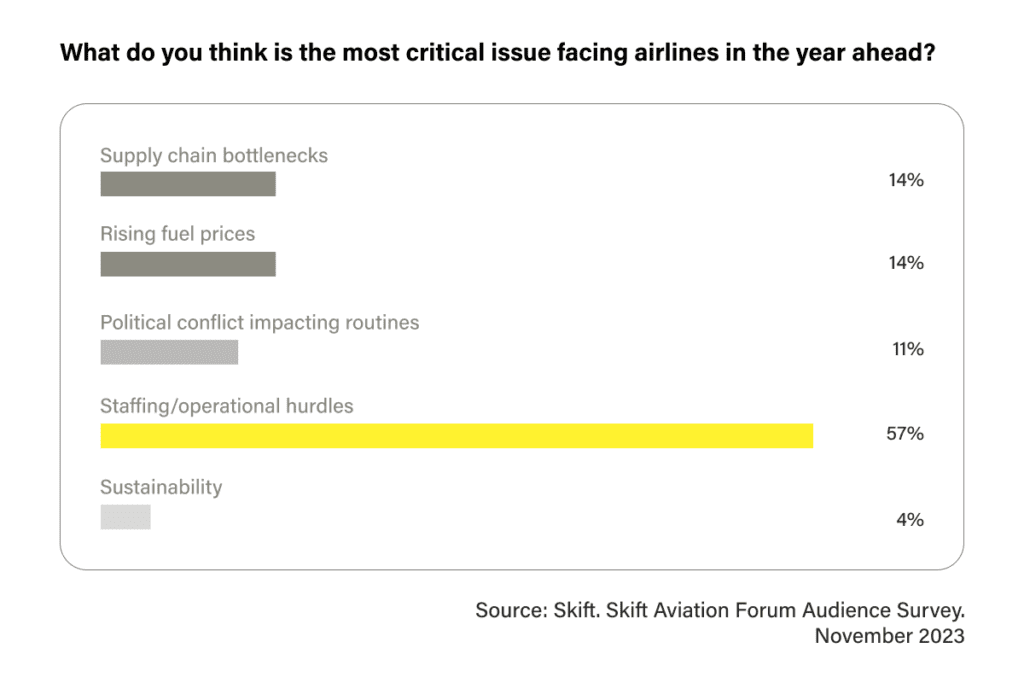Skift Take
What key issues is the airline industry grappling with as we enter the next phase of travel? We surveyed experts across aviation and airlines during this year’s Skift Aviation Forum to gain insight into their unique perspectives on what the future holds for the industry.
This sponsored content was created in collaboration with a Skift partner.
All eyes are on 2024 for the airline and aviation industries. According to the International Air Transport Association (IATA), industry-wide passenger traffic will recover to 2019 levels next year. IATA’s Director General, Willie Walsh, states that while the forecast for the evolution in passenger numbers gives good reason to be optimistic, the aviation industry still faces significant challenges.
During the recent Skift Aviation Forum, we polled our audience of more than 250 travel and airline industry executives to glean their insights on four top-of-mind challenges the industry is facing as we enter 2024. The experts weighed in on topics ranging from critical challenges surrounding sustainable aviation fuel adoption to the shifting landscape of corporate travel to the unique set of hurdles testing the resilience of Latin American airlines. Read on to gain a deeper understanding of the major developments shaping the trajectory of the aviation industry.
The Uphill Battle in Adopting Sustainable Aviation Fuel
Today, aviation represents 11 percent of U.S. transportation-related emissions. Sustainable aviation fuel — an alternative jet fuel made from renewable and waste feedstocks — holds great promise for reducing the aviation industry’s environmental impact. In September 2021, the White House issued a “Grand Challenge,” seeking to increase the production of sustainable aviation fuel to 3 billion gallons by 2030 and setting a goal to produce enough fuel to meet 100 percent of commercial jet fuel demand by 2050.

In our poll, 33 percent of aviation industry executives said they believe airlines will be able to hit the target of net zero by 2050. However, 67 percent of those polled don’t believe airlines are adopting this green alternative fast enough.
This group acknowledges there are several challenges that airlines must grapple with. First, sustainable aviation fuel production costs exceed traditional jet fuel. Airlines must partner with biofuel producers and seek government incentives to scale production and reduce costs. In addition, technology also poses a hurdle, requiring investment to streamline complex production processes.
The Evolving Landscape of Corporate Travel
Before the pandemic hit, corporate travel was the travel industry’s golden goose. However, with U.S. companies still working to persuade employees to return to offices, bookings have stagnated.
The most pessimistic view on corporate travel was held by 26 percent of airline industry experts, who believe this segment will never attain pre-pandemic levels. Another 43 percent acknowledge the segment is growing — slowly — expecting it will take longer than 2025 to return fully. Only 30 percent believe corporate travel will fully return by 2024.

Several factors contribute to corporate travel’s smaller piece of the pie. The rise of remote work and virtual meetings has reduced the need for extensive business travel. People are also less inclined to travel for work, with 39 percent stating they would prefer to never go on another work trip.
While the corporate travel picture remains murky at the moment, it’s clear that it won’t disappear completely. We must simply recognize that the composition of the corporate travel segment is changing, providing the industry with opportunities to engage with the new business traveler in innovative ways.
Five Disruptors in Navigating the Skies Ahead
The coming year holds myriad challenges for the airline industry. Of most significant concern among industry experts are staffing and operational hurdles, with 57 percent of Skift Aviation Forum attendees citing this as the most critical issue. Many carriers still face shortages of skilled personnel — particularly pilots and maintenance workers — making it challenging to meet air travel demand due to service disruptions, flight cancellations, and longer turnaround times.

Tying for second place, at 14 percent of responses each, were concerns over supply chain bottlenecks and rising fuel prices. Supply chain issues affect maintenance schedules and fleet readiness, while the surge in oil prices impacts airline operational costs, driving up ticket prices and squeezing profit margins.
With escalating wars and civil unrest occurring across the globe, political conflicts and geopolitical tensions were the top concern for 11 percent of airline decision-makers. Only 4 percent of attendees considered sustainability the most critical issue facing airlines in 2024.
Turbulence Affecting Latin American Airlines
IATA projects Latin American airlines will lose $1.4 billion this year. What’s causing this turbulence in profitability?
The majority of polled industry experts, 69 percent, believe the most significant hurdle facing Latin American airlines is inadequate airport infrastructure. Aging facilities, overcrowded terminals, and limited capacity hinder operational efficiency and result in suboptimal passenger experiences.

And although leisure demand remains strong, it doesn’t fully compensate for the absence of high-yield corporate travel. According to 23 percent of aviation executives, Latin American airlines need to address ways to maintain strong demand without corporate travel. They must diversify their revenue sources and target new segments to generate more stable income streams.
The lack of consolidation within the Latin American airline industry was considered the top challenge by 8 percent of industry leadership. Latin America’s fragmented market limits economies of scale and bargaining power. Consolidation can lead to advantages such as shared resources and cost savings, particularly crucial in their competitive and cost-sensitive market.
Chart a Course for the Future of Aviation
As the airline industry addresses these multifaceted challenges in the coming year, it’s clear that resilience and adaptability are essential. Moving forward with a spirit of collaboration, innovation, and strategic planning will be pivotal for paving the way to a more sustainable and dynamic future for aviation. By working together, the industry can successfully overcome these challenges, soaring to new heights as we shape the future of air travel.
This content was created collaboratively by AIG and Skift’s branded content studio, SkiftX.
Have a confidential tip for Skift? Get in touch
Tags: aviation, aviation industry, aviation news, skift aviation forum 2023, SkiftX Showcase: Aviation

